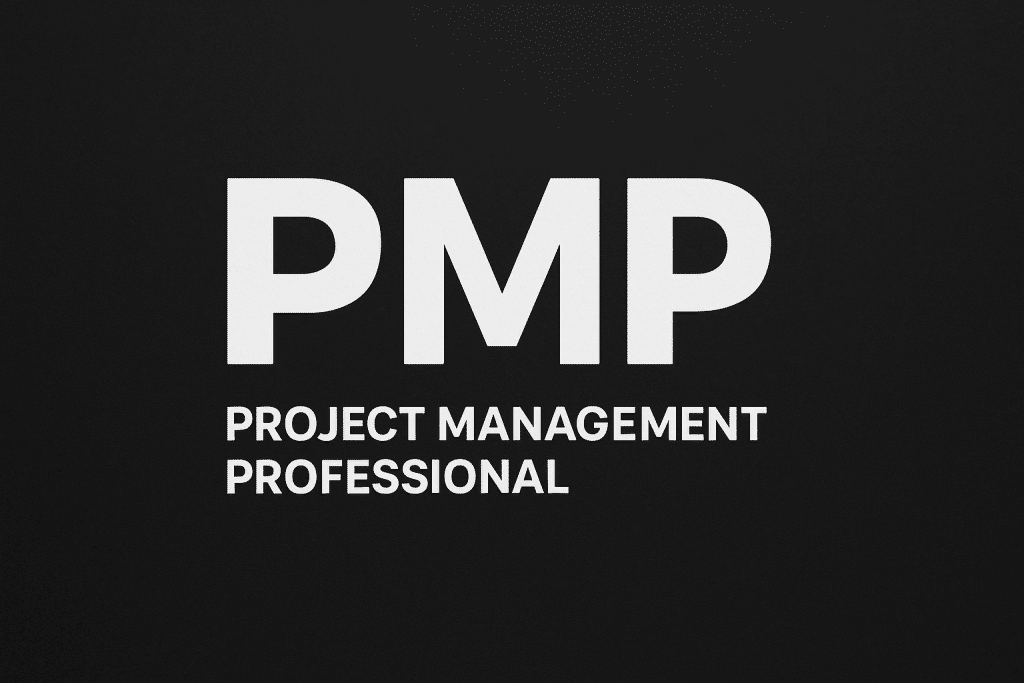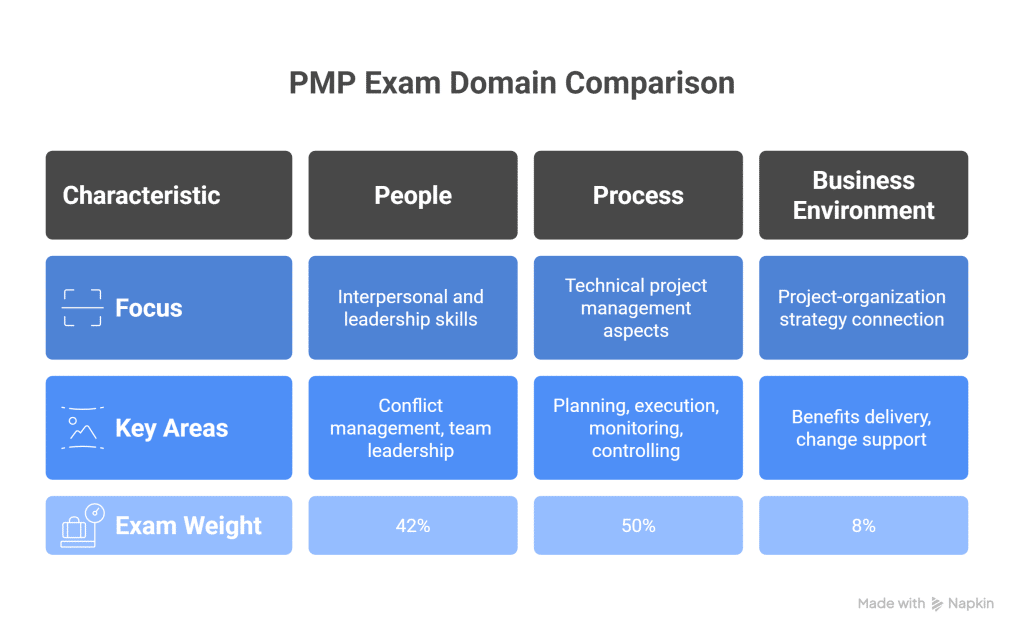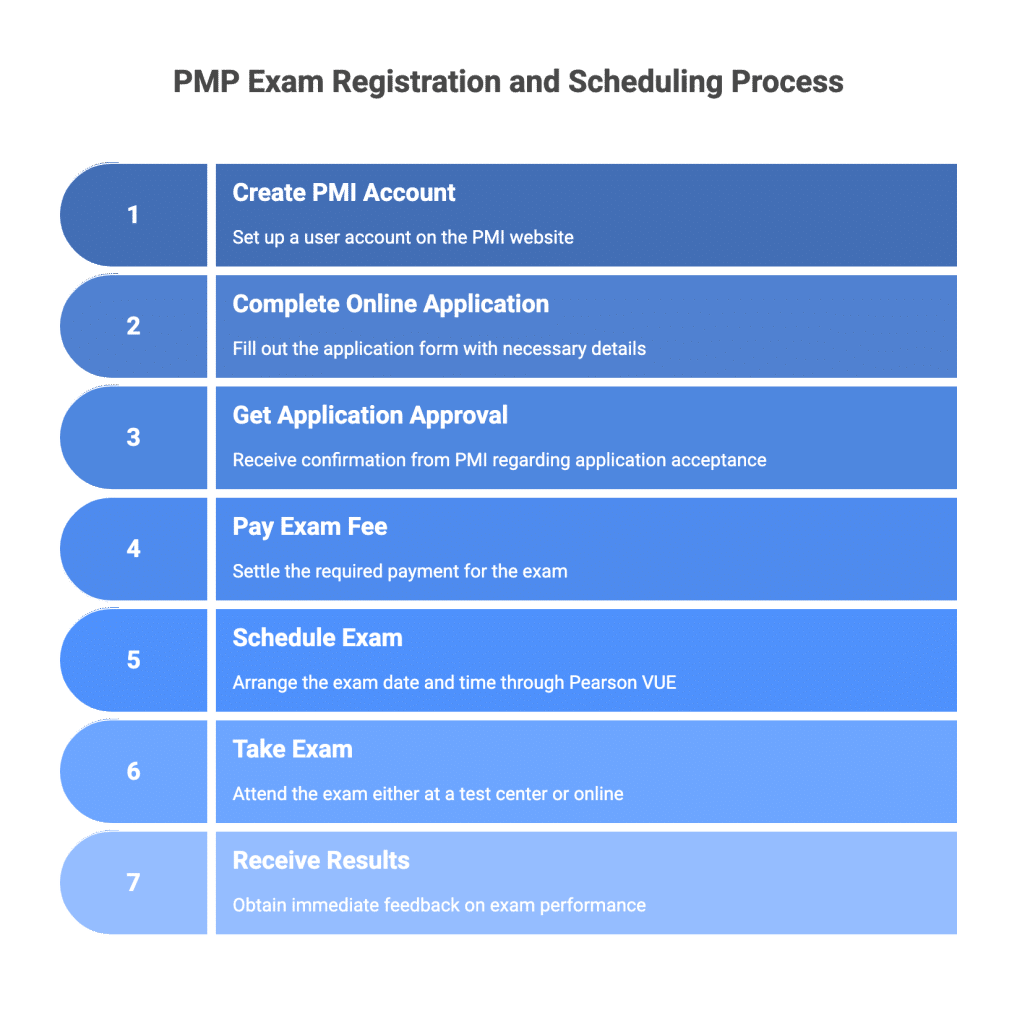
What is PMP?
The Project Management Professional (PMP) certification is one of the most globally recognized credentials for project managers, offered by the Project Management Institute (PMI). It validates a professional’s ability to lead projects, manage teams, and deliver results within scope, budget, and timelines. PMP covers predictive (waterfall), agile, and hybrid approaches, making it versatile for today’s project environments.
Who should take this exam
PMP is designed for professionals who are actively involved in managing projects and want to establish themselves as skilled project managers. This includes:
- Individuals transitioning into project management as a career path.
- Experienced project managers who lead cross-functional teams.
- Program managers and team leaders who want to formalize their knowledge.
- Professionals aiming for leadership roles in project-driven organizations.
Prerequisites and recommendations
To be eligible for the PMP exam, PMI requires:
- If you have a four-year degree:
- 36 months of project management experience.
- 35 hours of formal project management training (or CAPM® certification).
- If you have a high school diploma or associate’s degree:
- 60 months of project management experience.
- 35 hours of formal project management training (or CAPM® certification).
Recommendation: Even if you meet the experience requirements, it’s advisable to take structured training or prep courses to understand PMI’s project management framework better.
Exam objectives and domains
The PMP exam is based on three domains that reflect the real-world role of project managers:
- People – Interpersonal skills and leadership.
- Process – Technical project management methods.
- Business Environment – Understanding how projects align with organizational goals.

Objective details by domain
People (42%)
- Managing conflict, leading teams, supporting virtual teams.
- Building trust and empowering team members.
- Coaching, mentoring, and stakeholder engagement.
Process (50%)
- Executing projects with different methodologies (predictive, agile, hybrid).
- Managing project risks, scope, budget, schedule, and quality.
- Using tools, data, and best practices to ensure project success.
Business Environment (8%)
- Delivering project value and benefits realization.
- Ensuring project compliance with business strategy.
- Managing organizational change.
What changed in this version
The latest PMP exam update (effective January 2021) introduced:
- Domain weightage changes (People, Process, Business Environment).
- Equal focus on predictive, agile, and hybrid approaches.
- More emphasis on soft skills (leadership and communication).
- Scenarios and case studies to test practical application of knowledge.
Registration and scheduling
You can apply for the PMP exam through the PMI website. The process includes:
- Creating a PMI account.
- Completing the online application with details of your experience and education.
- Getting application approval from PMI.
- Paying the exam fee.
- Scheduling the exam via Pearson VUE (test center or online).
Pricing and vouchers
- PMI members: $405 USD
- Non-members: $555 USD
- PMI membership costs $129 annually (plus a $10 application fee), but it reduces exam fees and provides access to study resources.
- Organizations sometimes provide exam vouchers for employees.
Policies you should know
- You must present valid ID on exam day.
- You can reschedule or cancel up to 48 hours before the exam (fees may apply).
- Cheating or misconduct can lead to a ban from PMI exams.
- PMI audits a percentage of applications, requiring documentation of experience and education.
Scoring and results
- The PMP exam uses a psychometric scoring model.
- You will receive results immediately after completing the exam.
- Performance is categorized as: Above Target, Target, Below Target, or Needs Improvement.
- PMI does not disclose the exact passing score, but consistent performance across all domains is key.
Exam day and test experience
- Format: 180 questions, 230 minutes.
- Question types: Multiple-choice, multiple-response, hotspot, and matching.
- Two 10-minute breaks are allowed.
- Available both at test centers and online proctored exams (with webcam monitoring).
Study plan and resources
Start by reviewing the Exam Content Outline (ECO) from PMI. It explains the three domains (People, Process, Business Environment) and how questions are distributed. This helps you focus on high-weight areas.

Step 1: Understand the Exam Structure
Start by reviewing the Exam Content Outline (ECO) from PMI. It explains the three domains (People, Process, Business Environment) and how questions are distributed. This helps you focus on high-weight areas.
Step 2: Use the Right Study Materials
- PMBOK® Guide (7th Edition)
- This is the primary reference book from PMI.
- It explains project management principles, performance domains, and tailoring approaches for different project types.
- While some candidates find it dense, it’s essential for aligning your understanding with PMI’s terminology.
- Agile Practice Guide
- Since 50% of the PMP exam now includes agile and hybrid approaches, this guide is a must.
- It covers Scrum, Kanban, Lean, and other agile concepts you’ll need to answer scenario-based questions.
- PMP Prep Courses
- Online or in-person training programs (from PMI-Authorized Training Partners or reputed providers) are highly recommended.
- They usually provide 35 contact hours of project management education, which is also a mandatory prerequisite to sit for the exam.
- Courses often include recorded lectures, live sessions, practice questions, and study notes that simplify complex topics.
- Practice Exams and Question Banks
- These help you test your readiness and get comfortable with the question style.
- PMP questions are often situational, asking you to choose the “best” or “next” action rather than a straightforward fact.
- Taking practice exams under timed conditions improves speed and confidence.
- Flashcards, Study Groups, and Exam Simulator
- Flashcards help in memorizing formulas, definitions, and key concepts quickly.
- Study groups (online forums, LinkedIn groups, PMI chapters) provide motivation, discussions, and shared resources.
- Exam simulators replicate the real exam interface, so you can practice managing time and breaks across 180 questions.
Step 3: Create a Weekly Study Plan
Here’s a sample 8-week study plan (adjust based on your pace):
- Weeks 1–2: Read through the PMBOK® Guide and Agile Practice Guide to get familiar with concepts.
- Weeks 3–4: Enroll in a prep course or watch recorded sessions, making notes and highlighting key areas.
- Weeks 5–6: Start doing practice questions daily. Focus on weak areas (like agile, risk, or stakeholder engagement).
- Week 7: Take at least 2 full-length mock exams under exam-like conditions. Review incorrect answers carefully.
- Week 8: Revise notes, flashcards, and practice 50–100 questions daily until the exam.
Step 4: Balance Theory and Practice
Reading alone is not enough for PMP. You must practice applying knowledge to scenarios. For example:
- Instead of just memorizing “risk management processes,” practice answering what a project manager should do next when a stakeholder raises a new risk mid-project.
Step 5: Stay Consistent and Motivated
- Join PMP communities to stay accountable and share tips.
- Set a fixed study schedule (e.g., 2 hours each evening or 5 hours on weekends).
- Use Pomodoro technique (25 minutes study + 5 minutes break) to avoid burnout
Certification validity and renewal
- PMP certification is valid for 3 years.
- To renew, you must earn 60 PDUs (Professional Development Units) within each 3-year cycle.
- Renewal requires a renewal fee (discounted for PMI members).
Career outcomes
PMP-certified professionals enjoy strong career benefits:
- Enhanced leadership and strategic thinking skills.
- Recognition as a globally trusted project manager.
- Access to better job opportunities in industries like IT, healthcare, finance, and construction.
- Higher salary: PMP-certified project managers earn about 20–25% more than non-certified peers (based on PMI’s Salary Survey).
| Job Role | Description | Typical Salary Range (USD) |
|---|---|---|
| Project Manager | Leads projects from initiation to closure, managing scope, budget, and schedule. | $85,000 – $120,000 |
| Program Manager | Oversees multiple related projects to ensure strategic alignment. | $100,000 – $130,000 |
| Portfolio Manager | Manages a collection of programs/projects aligned with business goals. | $110,000 – $140,000 |
| Project Coordinator | Assists project managers in planning, scheduling, and reporting. | $60,000 – $80,000 |
| Operations Manager | Manages daily business operations with a project management approach. | $75,000 – $105,000 |
| Scrum Master / Agile Lead | Facilitates agile teams, removing blockers and ensuring delivery. | $90,000 – $115,000 |
| Consultant (Project Mgmt.) | Provides project management expertise to organizations on a contract basis. | $95,000 – $125,000 |
| PMO Director / Manager | Leads the Project Management Office, setting standards and governance. | $120,000 – $150,000 |
Related or next-step certifications
After PMP, professionals often pursue:
- PRINCE2® Certification as a complementary credential in some regions.
- PMI-ACP® (Agile Certified Practitioner) for agile project management.
- PgMP® (Program Management Professional) for managing multiple projects.
- PfMP® (Portfolio Management Professional) for overseeing project portfolios.
How this exam compares to similar certifications
- PMP vs. CAPM®: PMP is advanced and requires experience, while CAPM is entry-level.
- PMP vs. PRINCE2®: PMP is broader and globally recognized, while PRINCE2 is more methodology-focused and popular in Europe.
- PMP vs. Agile certifications: PMP now integrates agile, but Agile-specific certifications (like PMI-ACP or CSM) go deeper into agile frameworks.
Final Thoughts.
Preparing for the PMP exam can feel overwhelming, but the right resources make all the difference. At Cert Empire, you will find updated and reliable PMP exam dumps designed to help you practice real exam-style questions and understand concepts clearly.
Start your prep today with the latest PMP PDF Dumps by Cert Empire and boost your chances of success on the first try.
Frequently Asked Questions (FAQs)
How long should I prepare for the PMP exam?
Most candidates spend 2–4 months preparing, depending on their prior project management experience and the number of study hours they can dedicate each week. A structured study plan with practice tests usually leads to better results.
Is the PMP exam harder than CAPM?
Yes. The PMP is more advanced than CAPM because it requires documented project management experience and tests your ability to handle real-world, scenario-based questions. CAPM is entry-level, while PMP is for experienced professionals.
Can I take the PMP exam online?
Yes. PMI allows candidates to take the PMP exam either online (proctored with a webcam) or at a Pearson VUE test center. The online option is convenient but requires a quiet room, a stable internet connection, and compliance with strict security rules.
What happens if I fail the PMP exam?
If you don’t pass on your first attempt, you can retake the exam up to three times within one year of your application approval. Many candidates pass on the second attempt after reviewing weak areas and practicing more mock exams.
Do I need project management experience to pass the PMP exam?
Yes. Project management experience is a mandatory prerequisite to sit for the PMP exam. However, even experienced managers benefit from structured study, as PMI’s approach and terminology may differ from on-the-job practices.


